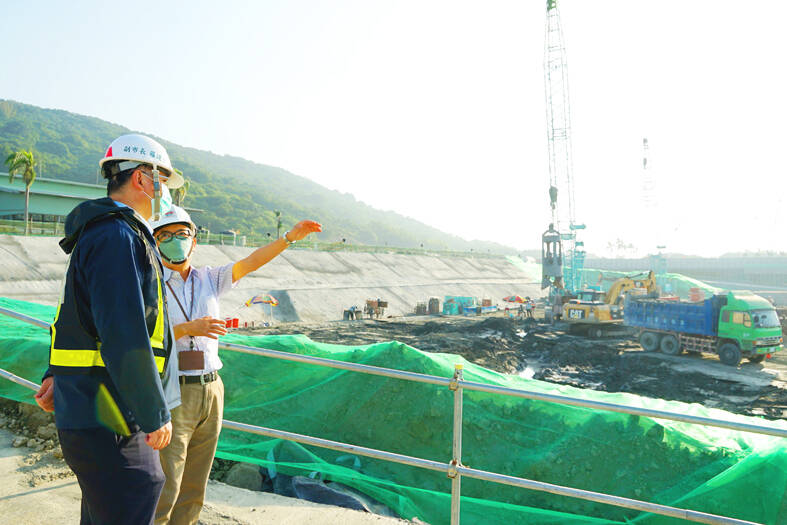Taiwan Semiconductor Manufacturing Co (TSMC, 台積電) yesterday said that construction of a factory in Kaohsiung to produce 28-nanometer chips is under way, with mass production set to start in 2024.
TSMC, the world’s largest contract chipmaker, made the announcement after reports about the company’s capacity expansion plans in Kaohsiung.
Industry insiders said that TSMC on Friday awarded the contract to build the new fab to Fu Tsu Construction Co (互助營造).

Photo courtesy of Kaohsiung Economic Development Bureau
The chipmaker, a major Apple Inc supplier, did not directly respond to the reports, saying only that construction had started following the completion of land grading.
TSMC previously said it intended to build a 7-nanometer and a 28-nanometer fab in Kaohsiung’s new Nanzih Technology Industrial Park (楠梓科技產業園區).
However, the chipmaker earlier this month said it was postponing construction of the 7-nanometer fab in response to weak demand, but said it would still build the 28-nanometer factory.
Starting in the fourth quarter of this year, the capacity utilization of 7-nanometer and 6-nanometer chips would not be as high as over the past three years, TSMC chief executive officer C.C. Wei (魏哲家) told an investors’ conference on Oct. 13.
At the conference, the chipmaker also said it would cut its capital expenditure budget for this year to US$36 billion from its previous estimate of US$40 billion to US$44 billion.
Nanzih Technology Industrial Park is on the site of the former Kaohsiung Refinery (高雄煉油廠) operated by state-owned oil refiner CPC Corp, Taiwan (台灣中油).
TSMC also declined to comment on media reports that it would replace Samsung Electronics Co as the manufacturer of next-generation assisted driving chips for Tesla Inc, the world’s leading electric vehicle maker.
Shares in TSMC fell 1.03 percent to close at NT$482 yesterday, as some investors sought to cash in their holdings after recent gains.
Its share price soared 10.31 percent last week on news that Berkshire Hathaway Inc had bought more than US$4.1 billion in TSMC’s American depositary receipts as of the end of September.
That came after a 15.6 percent rise in the stock from Nov. 7 to Nov. 11.
Warren Buffett’s conglomerate has not commented publicly on the deal, but market watchers attribute the purchase to TSMC’s cheap valuations, technology leadership and solid fundamentals.
“TSMC fell victim to today’s selling as the stock was moving closer to the nearest level of technical resistance at NT$500 after a recent rally,” Concord Securities Co (康和證券) analyst Kerry Huang (黃志祺) said. “But I have to say that TSMC’s long term prospects remain sound despite short-term market uncertainty.”

SEMICONDUCTORS: The German laser and plasma generator company will expand its local services as its specialized offerings support Taiwan’s semiconductor industries Trumpf SE + Co KG, a global leader in supplying laser technology and plasma generators used in chip production, is expanding its investments in Taiwan in an effort to deeply integrate into the global semiconductor supply chain in the pursuit of growth. The company, headquartered in Ditzingen, Germany, has invested significantly in a newly inaugurated regional technical center for plasma generators in Taoyuan, its latest expansion in Taiwan after being engaged in various industries for more than 25 years. The center, the first of its kind Trumpf built outside Germany, aims to serve customers from Taiwan, Japan, Southeast Asia and South Korea,

Gasoline and diesel prices at domestic fuel stations are to fall NT$0.2 per liter this week, down for a second consecutive week, CPC Corp, Taiwan (台灣中油) and Formosa Petrochemical Corp (台塑石化) announced yesterday. Effective today, gasoline prices at CPC and Formosa stations are to drop to NT$26.4, NT$27.9 and NT$29.9 per liter for 92, 95 and 98-octane unleaded gasoline respectively, the companies said in separate statements. The price of premium diesel is to fall to NT$24.8 per liter at CPC stations and NT$24.6 at Formosa pumps, they said. The price adjustments came even as international crude oil prices rose last week, as traders

Taiwan Semiconductor Manufacturing Co (TSMC, 台積電), which supplies advanced chips to Nvidia Corp and Apple Inc, yesterday reported NT$1.046 trillion (US$33.1 billion) in revenue for last quarter, driven by constantly strong demand for artificial intelligence (AI) chips, falling in the upper end of its forecast. Based on TSMC’s financial guidance, revenue would expand about 22 percent sequentially to the range from US$32.2 billion to US$33.4 billion during the final quarter of 2024, it told investors in October last year. Last year in total, revenue jumped 31.61 percent to NT$3.81 trillion, compared with NT$2.89 trillion generated in the year before, according to

PRECEDENTED TIMES: In news that surely does not shock, AI and tech exports drove a banner for exports last year as Taiwan’s economic growth experienced a flood tide Taiwan’s exports delivered a blockbuster finish to last year with last month’s shipments rising at the second-highest pace on record as demand for artificial intelligence (AI) hardware and advanced computing remained strong, the Ministry of Finance said yesterday. Exports surged 43.4 percent from a year earlier to US$62.48 billion last month, extending growth to 26 consecutive months. Imports climbed 14.9 percent to US$43.04 billion, the second-highest monthly level historically, resulting in a trade surplus of US$19.43 billion — more than double that of the year before. Department of Statistics Director-General Beatrice Tsai (蔡美娜) described the performance as “surprisingly outstanding,” forecasting export growth